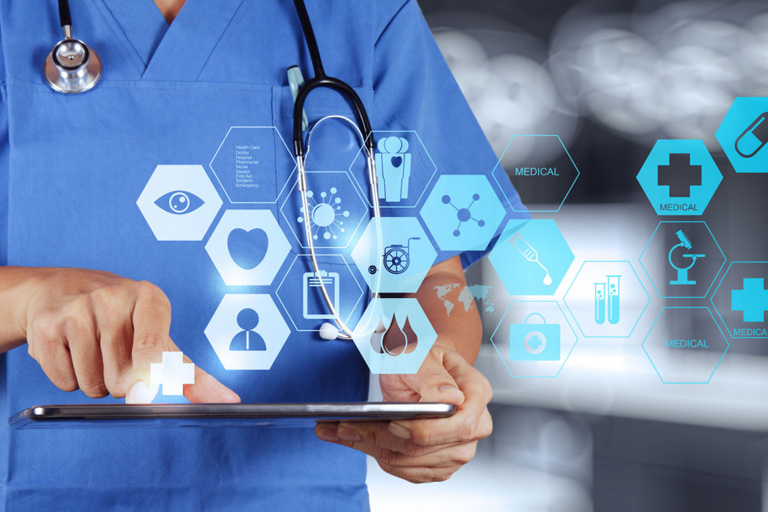When clinicians are delivering care, time is often critical. The evolution of electronic medical records (EMRs) in the healthcare industry has been rapid and impactful. In their current form EMRs are predictive, precise and personal, aid better access to care for more people, enable a seamless patient experience and leverage AI to turn complex data into actionable insights.
EMRs were first explored in the healthcare industry as a way to address the pressure of time-in-care delivery. By digitising arduous paper processes, EMRs were able to assist in addressing this challenge and improving clinical efficiency.
The healthcare landscape then continued to evolve, with more structured and connected processes introduced to EMRs to further reduce the duration and complexity of traditional processes, while minimising the resources required for tasks that affect overall healthcare operations delivery.
We then saw the role of EMRs shift to further support streamlined clinical workflows and with that, improved patient safety. Many tasks that were recognised as onerous or difficult are now seamlessly performed by EMR solutions, allowing care providers to focus on their patients and make informed clinical decisions using shared data along the value chain.
However, EMR adoption across the world has faced some challenges. Tailoring solutions to unique clinical challenges, ensuring that clinicians are supported by system usability and IT education, and achieving interconnectivity between different systems and providers are all crucial considerations in the effective adoption of EMRs.
Tailoring solutions to unique clinical challenges
There is no such thing as a ‘plug-and-play’ EMR implementation. In order to access meaningful data and insights, solutions must be tailored to the unique needs of the healthcare organisation. A solution will always depend on the focus, capability and data requirements of the health provider.
Beyond the core build-up, current and future workflows must be well defined and redesigned in the context of optimising care. Just as providers and prescribers tailor a treatment plan to the unique needs of the patient, so too must EMR solutions be tailored to the unique needs of the healthcare system.
Supporting clinicians in the implementation of EMRs
It is impossible to ignore the importance of clinicians in addition to IT professionals in the implementation of EMRs. While IT stakeholders are essential in the entire process, implementation of this infrastructure is optimised through the application of clinical knowledge and patient care experience. The peer-to-peer medical interactions are a core pillar to achieve success.
A solution can be strong on paper, but if it doesn’t fit the practical needs of the clinician it will be rejected. There must be benefits to the health system that improve the quality of care delivery to the patient.
It is the time invested in understanding the unique challenges faced by clinicians that allows EMR solutions to transform the delivery of health care for everyone, improving the experiences for both patients and clinicians.
Achieving interconnectivity: BoB vs BoS
To ensure that patient data is as accessible and meaningful as possible, we must consider the importance of best-of-breed’ (BoB) versus ‘best-of-suite’ (BoS) in healthcare infrastructure.
A BoB system will often see a number of systems in place which are interconnected in a transactional manner. The consequence of this infrastructure is that we often see significant rework, maintenance difficulty and overlap in the solutions to keep data aligned. More often than not, we see BoB systems complicating communication, rather than simplifying it, to make sense of data associated with clinical or nonclinical workflows.
A comprehensive EMR BoS system covers all workflows of a hospital — clinical, operational and administrative. This reduces maintenance and complexity, simplifies the user experience, ensures visibility across the patient’s care continuum and enables the health organisation to control running costs.
St. Andrew’s Toowoomba Hospital in Queensland is a hospital that is implementing an integrated solution across all care settings through a single platform and database that enables centralised, fully integrated management of clinical, organisational and administrative processes. With advanced clinical analytics allows for streamlining workflows, the platform will be driving quality and efficiency of care and patient safety.
There is exciting promise in the Australia and New Zealand region and across the world, as EMR providers continue to innovate to address the challenges faced by patients, clinicians and healthcare providers.
Our healthcare landscape will continue to experience change — an evolution that requires EMR vendors to maintain this momentum, too. Looking forward, next-generation EMR is innovating through solution, strategy, technology and change management.
With promising development in the areas of behavioural data analysis, early intervention and personalised patient care, next-generation EMR is exciting as we continue to work with clinical partners to innovate and evolve the delivery of care.


































